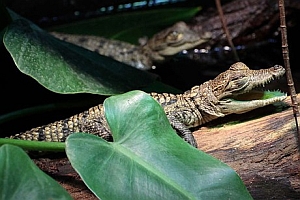Campeche, Mexico - Mexico's Morelet's crocodile is fast, deadly, and endangered. It inhabits freshwater swamps and marshes in the wild, but those habitats are shrinking, and illegal hunting for the crocs is rampant. However, somewhat ironically, there is hope in the form of a commercial crocodile farm called Cocodrilos Maya.
Cocodrilos Maya is a joint project, teaming breeders with Mexican environmental authorities, that aims to save the reptile in the wild by exploiting it in captivity.
They have found the right balance between conserving the Morelet's and providing locals with a new means to earn a living selling crocodile skin and meat, according to Tix-Chel Vazquez, a biologist at the farm.
"This type of project complements the three parts of sustainability; the environment, the social sector, and the economy with alternative products," says Ms Vazquez.
Cocodrilos Maya has been breeding Morelet's for ten years.
Eggs hatch after about 45 days in a specially-made incubator and baby crocs are then moved to protected enclosures where they spend about four years until adulthood.
According to Vasquez, more than 6,000 crocodiles have been bred on the farm this way, producing quality skins for markets overseas.
When consumers buy skins from farmed crocodiles there are fewer opportunities for poachers, say the authorities


